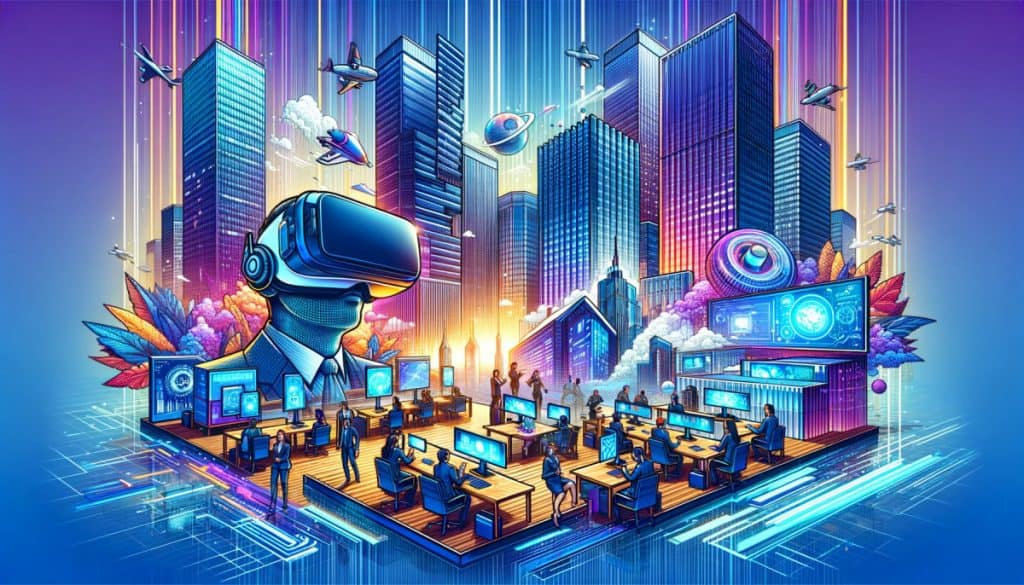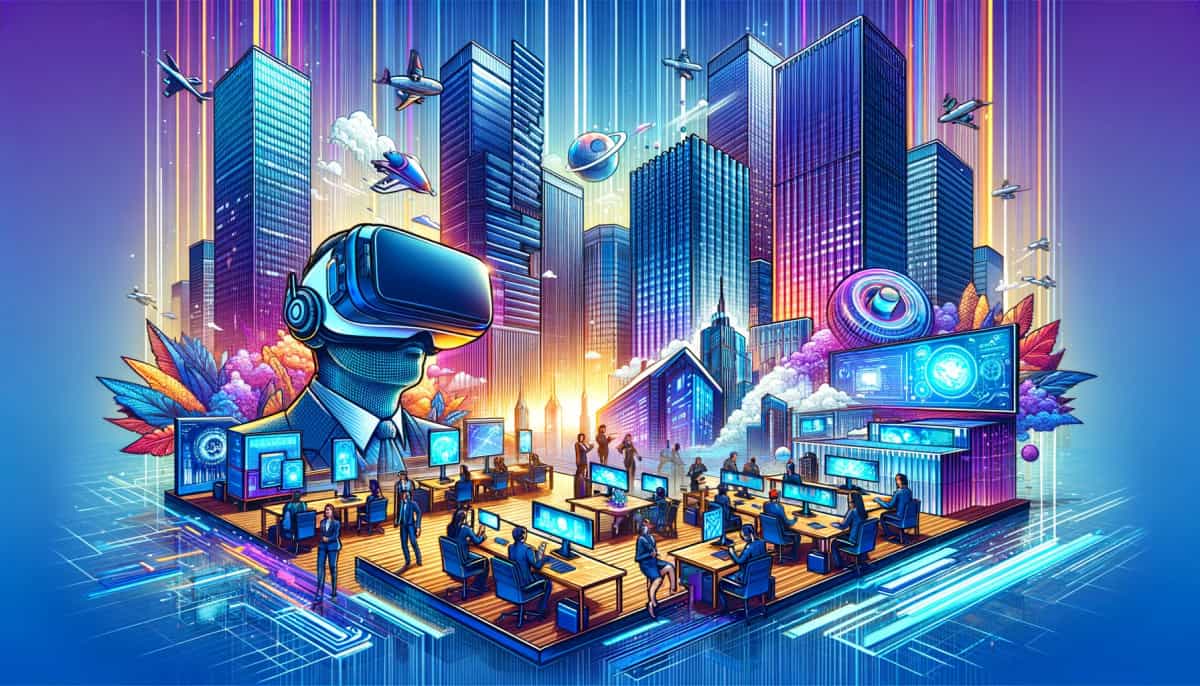
Posted: December 8, 2023 10:06 AM Updated: December 8, 2023 10:07 AM
briefly
XR is making significant progress in transforming workforce training, resulting in better employee training and improved business performance.

In a rapidly evolving technology development landscape, Extended Reality (XR), encompassing Virtual Reality (VR), Augmented Reality (AR), and Mixed Reality (MR), is steadily emerging as a pivotal force ready to transform the way we approach business. there is. Training and operations.
The once-fantastic concept of XR is becoming a real force, promising to reshape the way companies conduct and operate training. Using XR for training can provide numerous benefits to your business beyond just employee development. From enhancing collaboration and streamlining processes to optimizing resource allocation, XR has many applications.
In a conversation with Metaverse Post, Sarah Gilchriest, Chief People Officer at Workforce Learning, the group that encompasses QA, Circus Street, and Cloud Academy, shared XR’s profound impact on education and its potential to reshape the future of business.
Gilchriest highlighted how XR technologies provide a paradigm shift, providing trainees with realistic, hands-on learning experiences that go beyond traditional methods. She believes that virtual workspaces bridge geographic gaps and foster real-time collaboration. Simulating complex procedures helps companies proactively identify and correct potential problems.
“XR technologies provide immersive, interactive learning experiences that completely outperform traditional methods under certain conditions. This has the potential to open up new dimensions of employee development,” Workforce Learning’s Gilchriest told Metaverse Post.
“Trainees can move into simulated scenarios, replicating real-world environments and situations with unparalleled realism. “This immersive approach allows for hands-on learning, allowing trainees to develop critical skills, gain confidence and make mistakes in a safe and controlled environment,” he added.
What about XR? Industrial Operations Transformation
Gilchriest said that in the healthcare sector, XR is making significant progress in transforming education and patient care. VR simulations provide medical professionals with a realistic, risk-free environment to practice complex procedures.
“VR simulations provide medical students and professionals with hands-on experience in a realistic, risk-free environment to practice complex procedures and hone their skills. For example, surgeons can immerse themselves in a virtual operating room to recreate delicate surgeries and gain valuable experience before performing surgeries on real patients,” explained Workforce Learning’s Gilchriest.
Additionally, architects and engineers can leverage XR to visualize designs and effectively streamline project workflow. XR’s is also demonstrating excellence in education by bringing textbooks and classroom lessons to life through AR overlays and interactive 3D models.
“XR in the architecture, engineering and construction (AEC) industry is opening up new opportunities. Digitization and Building Information Modeling (BIM) or 3D modeling and visualization of the design and construction process have opened up a world of possibilities for optimizing building performance,” said Gilchriest. “Designers and facility managers have unprecedented insight into how a building’s layout affects a wide range of factors, including maintenance, lighting layout, and energy consumption.”
Likewise, Gilchriest shared that the entertainment industry is adopting XR to create engaging interactive experiences, from the virtual worlds of VR games to enhancing live events with MR overlays. AR is revolutionizing the retail environment, providing customers with an immersive shopping experience that bridges the gap between online and in-store interactions.
“VR allows consumers to visit their favorite retailers online with interactive storefronts in a virtual environment and virtually try out new looks from the comfort of their own home. The same goes for the possibility of people being able to view home interior products, such as a new sofa, in 3D at actual size in their own home,” she added.
Exploring the future of immersive education
XR technologies have tremendous potential to transform education across a variety of industries. Platforms like Meta Horizon Workrooms and Microsoft Mesh with Teams Avatars are at the forefront of delivering immersive and interactive training experiences.
Microsoft Mesh facilitates shared holographic experiences for individuals in multiple locations. Integration with Microsoft Teams allows for virtual meetings and collaborative document editing. Improves accessibility by allowing you to create personalized avatars without a headset.
Digital avatars that serve as the face of virtual meetings address the limitations of traditional video conferencing by providing more natural and engaging interactions. Tools like the Microsoft Teams Avatar Builder allow you to create expressive avatars to enrich your meeting experience.
“As the face of virtual meetings, avatars address the limitations of traditional video conferencing by providing a more natural and engaging way to interact. “The Microsoft Teams Avatar Builder lets you create and customize multiple avatars, including expressive reactions, to enhance your meeting experience,” Workforce Learning’s Gilchriest told Metaverse Post.
XR Technologies Reveals Opportunities and Caveats
Gilchriest says that while XR technologies offer promising benefits for education, potential risks include health and safety concerns, privacy and security issues, cost concerns, technical limitations and resistance to adoption.
“XR is still relatively new and there may be resistance to adoption by unfamiliar users, so companies embracing it will need to plan internal communications campaigns to get the right message out. The goal is for employees to become familiar with XR, understand how to use it safely and recognize the benefits of this type of training,” she emphasized.
Developing and deploying XR solutions can be expensive and difficult to scale for large organizations. Gilchriest argued that any company considering this route should look carefully at ROI. Currently, the most cost-effective use cases are for ongoing training initiatives, such as onboarding and skills that most team members need to acquire.
She said it would not make sense to develop more specialized and niche virtual training scenarios in-house. However, it is likely that more and more training providers will develop this type of experience.
“XR can also collect and transmit sensitive data, which can pose privacy and security risks if not managed properly. These must be properly evaluated and employees must be aware of all data collection practices,” Workforce Learning’s Gilchriest told Metaverse Post.
The future of education through XR has transformative potential. Overcoming barriers and limitations can improve the quality, accessibility, and efficiency of training, leading to better employee training and improved business performance.
disclaimer
In accordance with the Trust Project Guidelines, the information provided on these pages is not intended and should not be construed as legal, tax, investment, financial or any other form of advice. It is important to invest only what you can afford to lose and, when in doubt, seek independent financial advice. We recommend that you refer to the Terms of Use and help and support pages provided by the publisher or advertiser for more information. Although MetaversePost is committed to accurate and unbiased reporting, market conditions may change without notice.
About the author
Victor is the Managing Technology Editor/Writer at Metaverse Post and covers artificial intelligence, cryptography, data science, metaverse, and cybersecurity within the enterprise space. He boasts of five years of media and AI experience working at renowned media outlets such as VentureBeat, DatatechVibe, and Analytics India Magazine. Having worked as a media mentor at prestigious universities such as Oxford and USC, and holding a Master’s degree in Data Science and Analytics, Victor is committed to keeping up with new trends. He provides readers with the latest and most insightful stories from the world of technology and Web3.
more articles

Victor Day

Victor is the Managing Technology Editor/Writer at Metaverse Post and covers artificial intelligence, cryptography, data science, metaverse, and cybersecurity within the enterprise space. He boasts of five years of media and AI experience working at renowned media outlets such as VentureBeat, DatatechVibe, and Analytics India Magazine. Having worked as a media mentor at prestigious universities such as Oxford and USC, and holding a Master’s degree in Data Science and Analytics, Victor is committed to keeping up with new trends. He provides readers with the latest and most insightful stories from the world of technology and Web3.


